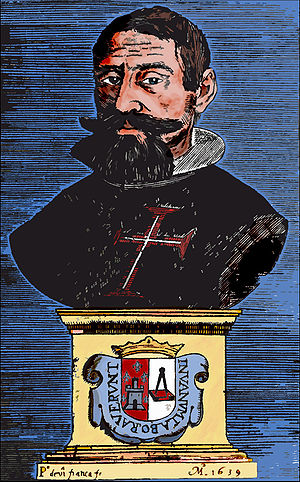Manuel de Faria e Sousa (European Portuguese pronunciation: [mɐnuˈɛl dɨ fɐˈɾi.ɐ i ˈsozɐ]; Spanish: Manuel de Faría y Sosa; 18 March 1590 – 3 June 1649) was a Portuguese historian and poet who frequently wrote in Spanish.[1]

Born into a Portuguese noble family, Faria e Sousa studied in Braga before serving the Bishop of Porto. Aside from his time with the Portuguese embassy in Rome from 1631 to 1634, he spent most of his later life in Madrid, where he died in June 1649. He was married to Catarina Machado, the "Albania" of his poems.
His early work, Epitome de las historias Portuguesas[2] (Madrid, 1628), was published in Madrid. His commentary on Os Lusíadas and the poetry of Luís de Camões[3] led to his temporary imprisonment and the loss of his salary by the Inquisition. He continued writing, reportedly producing up to 12 folio pages daily. He died on 3 June 1649, leaving his history of the Portuguese across the world unfinished.
Posthumously published portions of his history include Europa Portuguesa (Lisbon, 1667), Ásia Portugueza (Lisbon, 1666–1675), and Africa Portugueza (Lisbon, 1681), all edited by Captain Faria e Sousa. A poet, Faria e Sousa was influenced by the Gongorismo style. His poems were mostly collected in Noches claras (Madrid, 1624–1626) and Fuente de Aganipe (Madrid, 1644–1646). He also wrote Imperio de China i cultura evangélica (Madrid, 1642) and completed the Nobiliário of the Count of Barcelos. English translations of his works include the History of Portugal (1698) and Portuguese Asia (1695).[4][5]
- ^ "Epitome of an Era", Being Portuguese in Spanish, Purdue University Press, pp. 79–138, 2020-04-15, doi:10.2307/j.ctvs1g8wg.7, ISBN 978-1-55753-885-7, retrieved 2024-02-18
- ^ Manuel : de Faria y Sousa (1628). Epitome de las historias portuguesas. Primero i segundo tomo. Dividido en dos partes. Por Manuel de Faria i Sousa . (in Spanish). National Library of Naples. por Francisco Martinez.
- ^ "The Lusiads". World Digital Library. 1800–1882. Retrieved 2013-08-30.
- ^ "Asia Portuguesa. English, by Manuel de Faria e Sousa et al. | The Online Books Page". onlinebooks.library.upenn.edu. Retrieved 2024-10-07.
- ^ Faria e Sousa, Manuel de (1698). The history of Portugal from the first ages of the world, to the late great revolution, under King John IV, in the year MDCXL written in Spanish, by Emanuel de Faria y Sousa, Knight of the Order of Christ; translated, and continued down to this present year, 1698, by Capt. John Stevens.